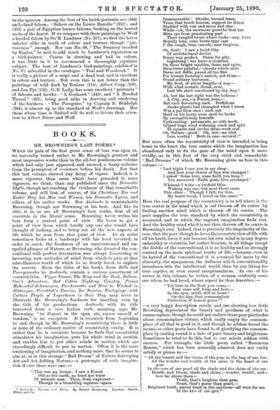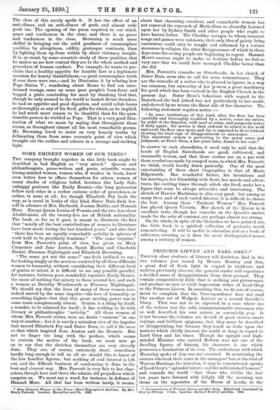BOOKS.
MR. BROWNING'S LAST POEMS.*
WHEN the pain of the first great sense of loss was upon us, we naturally turned rather to Mr. Browning's greatest and
most impressive works than to the all-but posthumous volume which had only just appeared, and secured a hasty welcome from the promptest of reviewers before his death. Not that this last volume showed any decay of vigour. Indeed, it is more vigorous than some which have preceded it, more vigorous, we think, than any published since the Dramatic Idylls, though not reaching the vividness of that remarkable volume, and still less, of course, of his Christmas Eve and Easter Day, his Men and Women, his Dramatic Lyrics, and others of his earlier works. But Asolando is unmistakable Browning, though not Browning at his best. And like its title, it is, as are all Browning's best works, first of all eccentric in the literal sense. Browning never writes his best from a central point of view. He loves to get a point of view from which hardly any one else would have thought of looking, and to bring out all the new aspects of life which he sees from that point of view. As an artist sometimes looks at a landscape with his head inverted, in
order to catch the freshness of an unaccustomed and un- spoiled glimpse of Nature, so Browning, who detested the con- ventional with perfect detestation, was always discovering or inventing new attitudes of mind from which to gaze at that miscellaneous world of which he so dearly loved to explore the secrets. Even the titles of his books, from Bells and
Pomegranates to Asolando, contain a curious assortment of eccentricities. Pippa Passes, The Bing and the Book, Balaus- tion's Adventure, Bed Cotton Nightcap Country, Prince Hohenstiel-Schwangau, Pacchiarotto and How he Worked in Distemper, Ferishtah's Fancies, La Saisiaz, Parleyings with Certain People of Importance in their Day, may serve to illustrate Mr. Browning's fondness for startling even by
the title of his productions. Asolando, with its title borrowed from a rare Ration verb, meaning, says Mr.
Browning, "to disport in the open air, amuse oneself at random," is no exception. It is eccentric from beginning to end, though in Mr. Browning's eccentricity there is little or none of the ordinary motive of eccentricity, vanity. It is rather that he is eccentric because he finds that eccentricity stimulates his imagination, puts his whole mind in motion, and enables him to put other minds in motion which are exceedingly difficult to put in motion. Often it is the mere awakening of imagination, and nothing more, that he seems to aim at, as in this strange "Bad Dream" of Nature destroying Art and Art defiling Nature,—a grotesque of eerie imagina- tion if ever there were one :—
"This VMS my dream : I saw a Forest Old as the earth, no tract nor trace
Of unmade man. Thou, Soul, explorest- . Though in a trembling rapture—space
• Asolando Fancies and Pacts. By Robert Browning. London : Smith, Elder, and Co
Immeasurable ! Shrubs, turned trees, Trees that touch heaven, support its frieze Studded with sun and moon and star : While—oh, the enormous growths that bar Mine eye from penetrating past
Their tangled twine where lurks—nay, lives. Royally lone, some brute-type cast I' the rough, time cancels, man forgives.
On, Soul ! I saw a lucid City Of architectural device Every way perfect. Pause for pity, Lightning ! nor leave a cicatrice On those bright marbles, dome and spire, Structures palatial,—streets which mire Dares not defile, paved all too fine For human footstep's smirch, not thine— Proud solitary traverser, My Soul, of silent lengths of way— With what ecstatic dread, aver, Lest life start sanctioned by thy stay !
Ah, but the last sight was the hideous ! A City, yes,—a Forest, true,—
But each devouring each. Perfidious
Snake-plants had strangled what I knew Was a pavilion once : each oak
Held on his horns some spoil he broke By surreptitiously beneath Upthrusting : pavements, as with teeth, Griped huge weed widening crack and split In squares and circles stone-work erat. Oh, Nature—good ! Oh, Art—no whit Less worthy ! Both in one—accurst !"
But more often the eccentricity of view is intended to bring home to the heart the true centre which the imagination has abandoned only to fix the gaze of the mind upon it more vividly, as in this first of the very vivid and remarkable "Bad Dreams" of which Mr. Browning gives us four in this
volume :—
" Last night I saw you in my sleep :
And how your charm of face was changed ! I asked 'Some love, some faith you keep ? You answered Faith gone, love estranged.'
Whereat I woke—a twofold bliss : Waking was one, but next there came This other : Though I felt, for this, My heart break, I loved on the same.'" Here the real purpose of the eccentricity is to tell where is the true centre in the mind which is not thrown off its centre by finding another mind which is thrown off its centre. The poet supplies the true standard by which the eccentricity is measured, and in which the vagrant imagination finds rest. And the healthy mind which is not thus thrown off its centre is Browning's own. Indeed, that is precisely the singularity of the case, that the poet, though he loves the eccentric view of life with all his heart, loves it not because his own mind is in any degree unhealthy or eccentric, but rather because, in all things except the dislike of the conventional, it is so healthy and so strongly centred on the main spiritual truths of life,—because even in its hatred of the conventional it is actuated far more by the obscurity, the opaqueness, the dullness which conventionality introduces into the intellectual world, than by any liking for true caprice, or even moral exceptionalness. In one of his verses in this volume, he writes of a woman, evidently some one whom he had loved, whose aspect he thus describes :—
" Yet here in the flesh you come,—
Your same self, form and face,— In the eyes, mirth still at home !
On the lips, that commonplace Perfection of honest grace!"
—a very happy description surely, and one showing how little Browning depreciated the beauty and goodness of what is commonplace, though he could not endure those poor platitudes about commonplace virtues which really empty the common- place of all that is good in it, and though he seldom found the means, as other poets have found it, of glorifying the common, place by casting round it a halo of pure beauty and brightness. Sometimes he tried to do this, but to our minds seldom with success. For example, the little poem called " Summuta Bonum," which has been generally admired, does not really satisfy or please us :— "AU the breath and the bloom of the year in the bag of one bee : All the wonder and wealth of the mine in the heart of one gem : In the core of one pearl all the shade and the shine of the sea : Breath and bloom, shade and shine,—wonder, wealth, and— how far above them—
Truth, that's brighter than gem,
Trust, that's purer than pearl,— Brightest truth, purest trust in the universe—all were for me In the kiss of one girl."
The close of this surely spoils it. It has the effect of an anti-climax; and an anti-climax of gash, and almost rude gush too. The opening of the poem required, to our mind, grace and tenderness in the close, and there is no grace and tenderness in the close. Browning is much more skilful in bringing out the solid goodness of commonplace qualities by abruptness, oddity, grotesque contrasts, than by lighting them up from within by sheer visionary insight. It is, as usual, by some eccentric study of these qualities, that he makes us see how central they are to the whole method and procedure of human conduct. For example, he wants to pro- claim that a healthy appetite for humble fare is a legitimate occasion for hearty thankfulness,—a good commonplace truth if ever there were one,—and he illustrates it by relating how Pope Sixtus V., wandering about Rome to find out Imre- dressed wrongs, came on some poor people's bean-feast, and begged a plate, concluding his meal by thanking God that, though he only seemed to the world to launch divine thunders, he had an appetite and good digestion, and could relish beans as thoroughly as any of his flock, gifts for which, as he implied, he had much more reason to be thankful than for the ques- tionable powers he wielded as Pope. That is a very good illus- tration of what we mean by saying that throughout these verses, as throughout almost all his most remarkable poems, Mr. Browning loved to insist on very homely truths by delineating them from some eccentric point of view which brought out the outline and colours in a strange and striking light.



















































 Previous page
Previous page